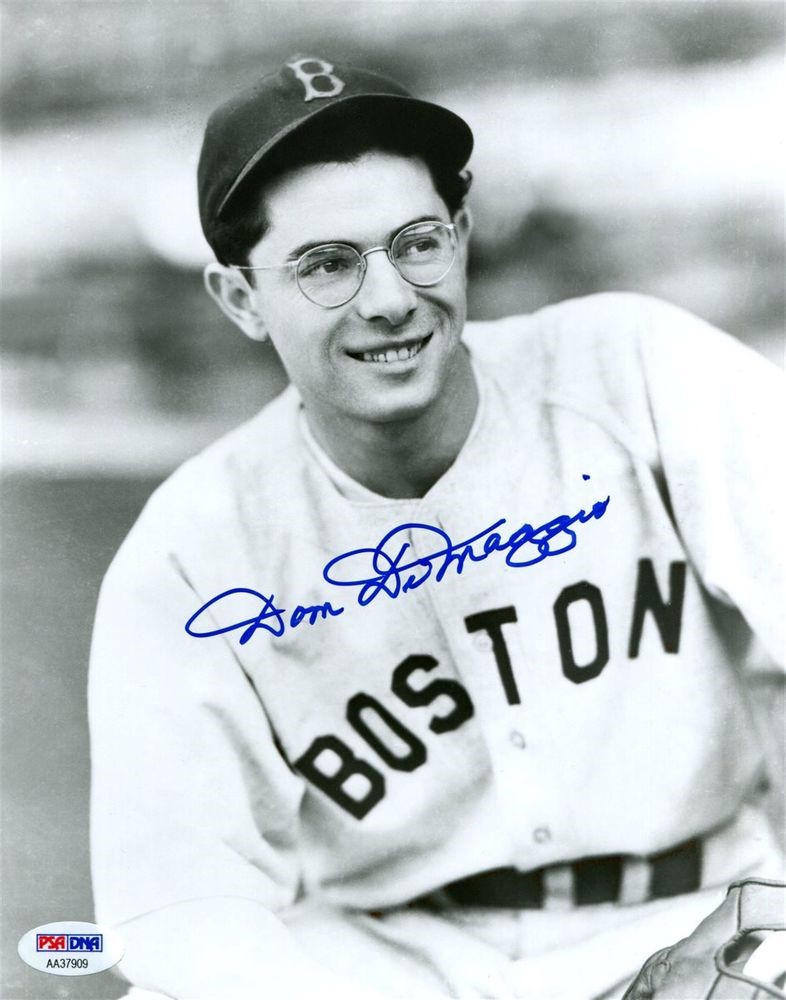Scroll Down to Read Today’s Essay
Subscribe to Baseball History Comes Alive for automatic updates. As a Free Bonus, you’ll get instant access to my Special Report: Gary’s Handy Dandy World Series Reference Guide
Dom DiMaggio Photo Gallery
Click on any image below to see photos in full size and to start Photo Gallery:
Today we welcome T.R. Healy with a nice little essay about a day he never forgot and a gift he will always treasure: An autographed ball from the “Little Professor,” Dom DiMaggio. In this short essay, Tom captures very well what baseball has meant to so many of us for so many years: memories that we’ll cherish forever. It also confirms what many have us have known for a long time: In addition to being a fine ball player, “Dommie,” as Ted Williams called him, was a great down-to-earth guy whose fame never seemed to swell his ego…in contrast to his more famous relation.
I’m sure all of us can relate to the sentiment T.R. felt that day when Dom DiMaggio took the time to engage with a young fan. It’s a day T.R. will always remember. Take a read and see if you agree. And if you have a similar story to tell, please do so in the comments section! -GL
“The Little Professor” Gives One Of Our Readers a Real Treasure:
An Autographed Ball!
“This spare and sensual object”
One of my most prized possessions is a very old baseball that I have kept for many years in a small cardboard box in a footlocker in my bedroom. A baseball is primarily a plaything, a toy, to be thrown and caught and hit, but the ball I have kept all these many years has never been played with by me or anyone else but has remained in its box. It is no different than any other baseball of its time, with a cork center wrapped in yarn and horsehide and stitched together with red-dyed thread, but what makes it special is that it was signed by “The Little Professor.”
Long, long ago, soon after the New York Giants moved their franchise to San Francisco, my family drove to California to see our first major league baseball game. One evening, before we returned home to the Pacific Northwest, we went to have dinner at DiMaggio’s Restaurant on Fisherman’s Wharf. My parents were quarreling again, about what I didn’t know, and there was so much tension at the table that my heart was knocking against my ribs. Any moment I expected one of them to get up from the table before anyone arrived to take our order and again another evening out would be spoiled.
Silently I prayed that didn’t happen. Then, as if an answer to my prayer, a short, spectacled man in a funeral black suit approached our table and welcomed us to the restaurant. He introduced himself as one of the members of the family business, but I was positive he wasn’t Joe DiMaggio, the great Yankee center fielder, who was taller and didn’t wear glasses. He said his name was Dom DiMaggio, one of Joe’s younger brothers, and hoped we enjoyed our meal. Almost at once, the tension between my parents dissipated and frowns turned into smiles and I was so grateful for his presence that I wished he could join us for dinner. That didn’t happen but he did ask if I would like a baseball and I said I would very much. He signed one and handed it to me.
Never before had anyone autographed a baseball for me so, consequently, Dom DiMaggio became my favorite player whom I never saw play. Out of curiosity, though, I went to my neighborhood library branch and read whatever I could find about his baseball career. Nicknamed “The Little Professor” because he wore glasses and was small in stature, he played center field for eleven seasons for the Boston Red Sox. [Recent essay on the career of Dom DiMaggio] Twice an All-Star, he was a leadoff batter through most of his career. An excellent fielder with a strong arm, he was fast enough to lead the American League in stolen bases one season. At the time of his retirement, his 34-game hitting streak was a Red Sox record. Though not the star his older brother was, he was good enough to be inducted into the Red Sox Hall of Fame.
The astute baseball writer Roger Angell once referred to a baseball as “this spare and sensual object.” That certainly described the ball I was given one evening at DiMaggio’s Restaurant. Stored in a locker so no one could damage it, it meant as much to me as anything I owned. It was something I cherished, a treasured keepsake to be sure, but more than that it represented a kind of tranquility, a temporary injunction against current troubles. Some people carry medals and prayer beads to comfort them in times of stress and difficulty. I didn’t carry the DiMaggio signed baseball with me but on many occasions, I recalled that evening when I was presented the ball. Often the remembrance helped me cope with difficult situations and for that, I shall always be grateful to the man whose manager said, “He always did everything right.”
T.R. Healy
Subscribe to our website, Baseball History Comes Alive with over 1400 fully categorized baseball essays and photo galleries, now surpassing the one million hits mark with 1,118,000 hits and over 950 subscribers

